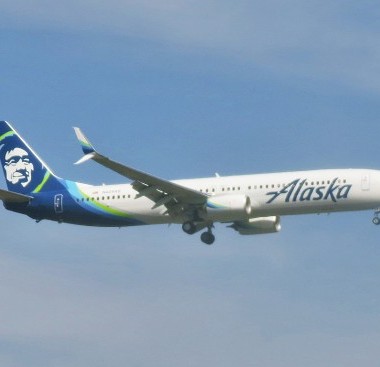Boeing crisis derails airline growth plans as output stalls
Boeing Co.’s crisis of confidence is spreading to the airlines that buy its jets.
Major carriers from United Airlines Holdings Inc. to Southwest Airlines Co., Delta Air Lines Inc. and Alaska Air Group Inc. gathered at an industry conference on Tuesday, and most of them had a similar story about how Boeing’s troubles are bleeding into their businesses. Most notably, airlines lack the aircraft they had previously planned on receiving in 2024 because Boeing has slowed output.
And the troubles run deeper than just this year. At the JPMorgan investor event, United Chief Executive Officer Scott Kirby said he’d gone as far as telling Boeing to stop building 737 Max 10 jets for the carrier because the timeline for certification of the largest variant of the single-aisle jet has become so uncertain.
Southwest said it doesn’t expect to receive any of its long-awaited 737 Max 7 aircraft this year, and will receive only 46 Max 8 models. It had previously anticipated 79 planes. The airline plans to cut capacity in 2024 and it’s reducing most hiring — including 50% fewer pilots and 60% fewer flight attendants — as it reviews its spending plans in response to reduced deliveries from Boeing.
Alaska Airlines, the carrier that suffered the accident on Jan. 5 with a Boeing 737 Max 9 that started the planemaker’s current woes, said Tuesday its capacity outlook remains “in flux” because of uncertainty around deliveries.
International customers are also being hurt. Irish discount carrier Ryanair Holdings Plc said on March 1 that its annual passenger forecast will drop to just under 200 million, compared with a previous goal of 205 million, because it will only receive 40 Boeing planes, rather than the 57 originally anticipated.
Top executives across the airline industry have implored Boeing to urgently address its growing problems. The company needs to “get the issues understood and get the issues fixed,” Southwest CEO Bob Jordan said at the conference. “We all need Boeing to be stronger two years from now, five years from now, 10 years from now. That takes precedent over delivery delays. We all need Boeing to be better.”
Industry Bottleneck
The crisis has created a massive bottleneck in an industry where there are only two main suppliers to choose from: Boeing and rival Airbus SE. Kirby said he’d seek a deal with Airbus for their A321neo, but with the European company’s order book stretching well into the next decade, patching up the holes left by Boeing will be hard even for the most dedicated buyers.
On March 10, Delta CEO Ed Bastian said deliveries of its 737 Max 10 aircraft could be pushed out to as late as 2027. Delta planned to use the largest Max model — ordered in July 2022 — within its domestic network. The airline has been taking Airbus’s A321 instead.
Boeing, for its part, is trying to navigate an increasingly thorny path to recovery. It has been ordered by the Federal Aviation Administration to cap output of its bestselling 737, denying it vital cash flow while Airbus charges ahead with its competing A320 family. Those diverging tracks were laid bare on Tuesday, when Boeing unveiled that it handed over 27 airplanes to customers in February, lagging the 49 notched by Airbus in the month.
Investors are increasingly spooked. Boeing stock has lost 29% in value this year, by far the worst performer on the Dow Jones Industrial Average. Chief Executive Officer Dave Calhoun has refrained from providing annual financial targets, seeking to focus the company’s entire attention not on financial metrics but on its safety record.
Boeing shares sank as much as 4.6% in New York trading, the biggest intraday decline since Jan. 25. The company is under the glare of the FAA, which has given Boeing 90 days to prove it can fix its manufacturing processes.
Speaking to reporters on Monday, FAA Administrator Mike Whitaker said the agency has increased its audit staff “pretty significantly,” with its own people on the Boeing shop floors monitoring the assembly line.
“It wasn’t just paperwork issues, sometimes it’s the order in which the work is done, sometimes it’s tool management, which sounds kind of pedestrian but is really important in a factory,” Whitaker said. “It’s really plant floor hygiene.”
The New York Times reported that the FAA found Boeing failed 33 of 89 safety audits, with 97 cases of noncompliance recorded. The company’s safety culture was also faulted by a panel of aviation experts.
Boeing Commercial Airplanes CEO Stan Deal on Tuesday admonished staff to precisely follow every step of the company’s manufacturing procedures and speak up about safety or quality missteps.
The vast majority of problems found by the FAA during the agency’s recent audit “involved not following our approved processes and procedures,” Deal said in a message to employees outlining steps it has taken to bolster quality and safety. “We have more to do and you play an important role,” Deal said.
Similar Stories

Citywide sale-leaseback highlights Phoenix Airport submarket
View Article
Silk Way Alat Free Economic Zone Company and Modern Construction Group sign landmark agreement
View ArticleCPaT announces new contract with expanding airline, Blue Jet Airways KG
CPaT Global, the world’s leading provider of distance learning for the airline and aviation industry, today announced a new contract with Blue Jet Airways KG. CPaT will provide Blue Jet…
View Article
Norse Atlantic expands to Stockholm with new direct flight to Bangkok
View Article
LATAM Cargo Group launches pioneering initiative in Chile with recycled plastic pallets
View Article
WorldACD Weekly Air Cargo Trends (week 46) - 2024
View ArticleGet the most up-to-date trending news!
SubscribeIndustry updates and weekly newsletter direct to your inbox!





